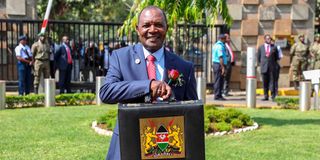
Treasury Cabinet Secretary Prof Njuguna Ndung'u displays the ceremonial briefcase before he presented his budget proposals at Parliament Buildings in Nairobi on June 13, 2024.
Treasury Cabinet Secretary Njuguna Ndung’u announced a raft of sharp expenditure cuts, a freeze on employment and new tax measures in a budget that mirrored recent demands by the International Monetary Fund (IMF) for deep public sector reforms.
Prof Ndung’u, in his 2024 budget statement presented to Parliament on Thursday, outlined plans to audit and cleanse public payrolls, pension and cash transfers to the vulnerable, where it’s suspected that massive leakage of public funds is being perpetrated through corrupt schemes.
The Treasury CS said the reform proposals in his Sh3.92 trillion budget are aimed at containing a soaring public wage bill, which hit Sh1.1 trillion in June 2023, and “eliminate ghost workers as well as enforce payment of salary scales” as approved or recommended by the Salaries and Remuneration Commission.
The IMF, which has loaned Kenya billions of dollars in budget and currency support in recent years, has tied the aid to a string of demands for economic and governance reforms.
“The public sector wage bill continues to rise leaving few resources for development. Public sector wage bill stood at 38.2 percent as a ratio of total revenue in 2021,” Prof Ndung’u said.
“To contain the wage bill, the government implemented a wage freeze in the financial years 2021/22 and 2022/23, in addition to eliminating and streamlining a number of allowances.”
A Unified Human Resource Information System for the entire public service is set to be rolled out from July to effect the payroll reforms.
The new system, to be linked to the Kenya Revenue Authority’s i-Tax system, will consolidate data on human resource and payroll, facilitating access through a single warehouse.
“This reform will eliminate the multiple, manual and stand-alone payroll systems,” Prof Ndung’u said.
Additionally, the Treasury wants ministries, departments and agencies to suspend hiring for the next one year.
The government has maintained a moratorium on new employment in the civil service since December 2013, which has restricted hiring to essential sectors such as security, education and health in a bid to rein in the public wage bill.
Prof Ndung’u also announced the suspension of all refurbishments and partitioning of government offices and purchase of furniture for one year and rationalisation of all allocations for purchase of motor vehicles.
This is in addition to cuts on foreign travel and curtailing of training expenses, which will be restricted to within State institutions. Procurement for common user items will be consolidated to achieve quantity discounts.
Other measures include reducing allocations to semi-autonomous government agencies by 30 percent and requiring the entities to surrender surplus funds to the Treasury.
The Treasury also plans to review insurance schemes in public sectors such as the Edu Afya scheme for schools as well as medical covers for the public service, police, prisons, commissions and independent offices, which will be put under the Social Health Insurance Fund.
The reforms indicate that President William Ruto is keen to implement the stringent conditions that came with loans from the Bretton Woods institutions.
“Enhancing tax compliance and increasing the efficiency of expenditures through public expenditure and wage bill reforms, State-owned enterprise restructuring, rationalising unproductive current spending, and better targeting of subsidies and transfers while ring-fencing social and development spending will be key to enhancing the credibility of the consolidation strategy in 2024/25 and the medium term,” the IMF wrote in a statement following the conclusion of the seventh review of Kenya’s medium term funding programme.
A Cabinet meeting earlier on Thursday had hinted at the reforms that Prof Ndung’u highlighted in his budget statement.
A dispatch from State House read in part: “In line with the administration’s fiscal consolidation strategy, which seeks to reduce government borrowing, and in pursuit of the aspiration to achieve a balanced budget by 2027, the proposed budget consolidates these efforts by reducing the budget deficit by nearly 50 percent.”
The Treasury expects to cut the budget deficit for the upcoming year by 35.46 percent to Sh597 billion from estimated Sh925 billion for the current year.
The slowdown in growth in the budget will, nonetheless, be realised on condition of ministries, departments and agencies keeping expenditure within their budgets and the Kenya Revenue Authority hits the set tax targets.
“The targeted reduction in recurrent expenditure is commendable. However, it should be noted that similar efforts when the budget estimates in the past have not achieved the intended goal,” The Budget and Appropriation Committee of the National Assembly wrote in its report.
“Indeed, there is tendency to revise recurrent expenditure upwards through supplementary budgets. Therefore, for the fiscal consolidation strategy to be actualised, supplementary budgeting must be limited to changes informed by actual trends in revenue performance.”
The IMF-backed reforms are aimed at ensuring the country starts living within its means in three years.
The Sh3.92 trillion expenditure estimates for the upcoming financial year that starts on July 1 represent a marginal rise of 1.82 percent over the Sh3.84 trillion budget for current year ending this month.
The rise in the budget is the slowest the country has witnessed in recent years, signalling a break from the past decade where expenditures have largely grown faster than tax revenue.
Total public expenditure has on average grown by eight percent in the past five years.
Prof Ndung’u said enforcement of the bold measures will place the country towards a path of a “balanced budget”.
A balanced budget means keeping borrowing at bare minimal levels, a feat the country has failed to achieve in the past, including during President Ruto’s first full financial year in power ending this month.






